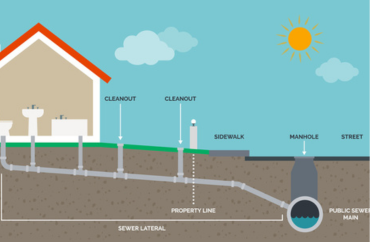The Ultimate Guide to Home Drainage Systems & Their Benefits
Water drainage is one of the most crucial aspects of home construction and maintenance. A proper home drainage system helps prevent water accumulation, foundation damage, mould growth, and other structural issues. Without an effective drainage system, excess water from rain or daily household activities can seep into walls, weaken foundations, and lead to expensive repairs.
What is a Water Drainage System?
A water drainage system is a network of pipes, gutters, slopes, and drains designed to remove excess water from a house. The goal is to prevent water stagnation, avoid seepage, and protect the structural integrity of the building.
Sources of water that need drainage include:
- Rainwater
- Wastewater from sinks, toilets, and bathrooms
- Groundwater seepage
- Excess water from gardening or landscaping
An effective drainage system ensures smooth water flow away from your home, keeping it dry, safe, and free from water-related damages.
Types of Water Drainage Systems in Homes
There are several types of drainage systems, each serving a specific purpose. Here are the most common ones:
1. Surface Drainage System
- Designed to remove excess rainwater from driveways, patios, and gardens.
- Includes gutters, surface drains, and graded slopes to direct water away.
- Prevents waterlogging and foundation weakening.
2. Subsurface Drainage System (French Drains)
- Installed beneath the soil to manage underground water flow.
- Helps prevent soil erosion and protects the foundation from excessive moisture.
- Commonly used in basements and near retaining walls.
3. Gutter and Downspout System
- Directs rainwater from the roof to a drainage outlet, preventing leaks and moisture buildup.
- Helps keep walls dry and prevents roof damage.
- Regular cleaning is essential to avoid blockages.
4. Slope Drainage System
- Utilizes gravity to move water away from home structures.
- Often used in sloped terrains to prevent erosion and foundation damage.
5. Combined Drainage System
- A single drainage system that handles both rainwater and wastewater.
- Can be effective but may lead to overload issues in heavy rainfall.
6. Greywater Drainage System
- Recirculates wastewater from sinks, showers, and laundry for reuse in irrigation.
- A sustainable drainage option that reduces water wastage.
Why Are Water Drainage Systems Important?
A good drainage system is essential for the following reasons:
1. Prevents Water Accumulation
- Stagnant water can lead to mould growth, foul odours, and pest infestation.
2. Protects Home Foundation
- Excess water weakens the foundation, leading to cracks and structural instability.
3. Reduces Soil Erosion
- Proper drainage prevents soil displacement, ensuring the stability of gardens and landscaping.
4. Prevents Basement Flooding
- A well-planned drainage system keeps basements dry and mold-free.
5. Improves Health & Hygiene
- Eliminates breeding grounds for mosquitoes, bacteria, and mould, improving indoor air quality.
How to Maintain an Effective Water Drainage System?
Proper maintenance is key to keeping your drainage system functional. Follow these expert tips:
Regularly Clean Gutters & Drains – Remove debris to prevent clogging.
Check for Leaks & Cracks – Repair broken pipes to avoid leaks.
Install Proper Slopes – Ensure water flows away from your home.
Use Drain Covers – Prevent leaves and dirt from blocking drains.
Inspect Drainage After Rainfall – Look for pooling water and fix issues immediately.
Consider Waterproofing – Apply coatings in basements to prevent seepage.
A well-designed water drainage system is a fundamental part of home safety. From preventing foundation damage to improving indoor hygiene, proper drainage ensures long-term protection for your home. Whether you're building a new house or upgrading an old one, choosing the right drainage system and maintaining it regularly will save you from costly repairs in the future.
By implementing the right drainage solutions, you can keep your home dry, strong, and secure for years to come! 🚰🏡
FAQs
- What is the best drainage system for a house?
A combination of surface drainage, subsurface drainage, and a proper gutter system works best for homes.
- How can I prevent water from accumulating around my house?
Ensure proper sloping, install French drains, clean gutters regularly, and use water-resistant materials.
- Can poor drainage cause foundation damage?
Yes! Poor drainage leads to soil erosion and water accumulation, which weakens the foundation over time.
- What is a French drain, and do I need one?
A French drain is a trench filled with gravel or pipes that redirects water away from your house. It's ideal for basements and water-prone areas.
- How often should I clean my drainage system?
Regular maintenance every 3-6 months is recommended to keep your drainage system working efficiently.
